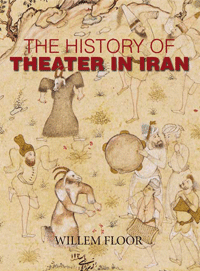
Growing weaker
Amir Reza Koohestani's play in London's Royal Court
July 21, 2005
iranian.com
Young playwright and director Amir Reza Koohestani's take on the
pregnant woman: “It doesn't kick like they say, but when I
walk it feels like a bucket of water is shifting around in my stomach.
I always worry I might lose it one day when I go to the toilet.”
Amid
The Clouds (Dar Miyan-e-Abrha), which runs at London’s Royal
Court until July 23, charts the journey of two Iranian refugees
travelling across Europe to the UK: the oddly-named Imour (Hassan
Madjooni) and the woman known as “the girl” [“een dokhtareh”]
(Shiva Fallahi).
The story, of which there is little, is largely
conveyed through monologues loaded with confused metaphors. Take
when Imour says (in the translation by Vali Mahlouji): “I
dream of my mother who has two shotguns hanging from her breasts
which she can’t detach no matter how hard she tries. The
guns are sucking her milk and with every suck she grows weaker
and thinner, and there is nothing she can do. Finally she puts
her hand on the triggers and fires.”
Water enters Imour’s ears that never comes out again and
means he always hears the “sound of the sea”. At times,
the actors are submerged in one of three Damien Hirst-style fish
tanks. These in turns evoke a river, amniotic fluid and Damien
Hirst-style fish tanks. At one point, just before a shave, Imour
produces a fish, anybody’s guess why.
 Mid-journey, in Eastern
Europe, Imour describes the locals: “Mostly racist fundamentalists
who've got it in for the Moslems; and with all her veils and wraps,
this girl is a good target.” Imour adds: “This girl’s
headscarf is my only worry -- the woman’s veil is more
hateful to these nude and naked Europeans [than a man’s moustache]”. Mid-journey, in Eastern
Europe, Imour describes the locals: “Mostly racist fundamentalists
who've got it in for the Moslems; and with all her veils and wraps,
this girl is a good target.” Imour adds: “This girl’s
headscarf is my only worry -- the woman’s veil is more
hateful to these nude and naked Europeans [than a man’s moustache]”.
The refugee fleeing the injustices of an Islamic system is willing
to risk being attacked by racists rather then expose her hair.
Later she talks of going to a mosque. Why she left Iran in the
first place is a mystery -- a woman who appears to have willed
a miraculous conception because she could not bear the touch
of a man.
Preggers woman on a plane: "It's cloudy here and there's
a lot of turbulence. It's making me feel sick.” Deeper insight
follows: “There's so much I don't know about pregnancy. My
emotions have changed. My pains are different. I don't see blood
anymore.” Later, in a fit of craving she wants nothing more
than a “hot meal, a glass of tea or even hot water.” Imour’s
reference to kessafat kari, (filthy business) Mahlouji’s
unhelpfully translates to “sex”. He gets a bar job
in a Croatia-Slovenia border town: “There's an elderly woman
... who runs this place with a Croatian girl. This girl's the only
official
prostitute in the area. She's not bad looking, either. She hasn't
lost her looks yet, fucking three or four times a day with the
randy, tough locals. And she's doing well.” Smugglers and
travellers keep her so busy “she hasn't got time to stand
behind the bar anymore, and that's why they needed someone -- both
to take care of the till and to stop any rowdiness.”  The West
is a place for pimps and whores. “We watched so many dirty
films that in the end they made a bunch of perverts out of us. Although,
for my part I admit, there are still details of this field of filth
that I am keen to get to grips with -- everyone's
a little intrigued by the workings of the groin.” Indeed. The West
is a place for pimps and whores. “We watched so many dirty
films that in the end they made a bunch of perverts out of us. Although,
for my part I admit, there are still details of this field of filth
that I am keen to get to grips with -- everyone's
a little intrigued by the workings of the groin.” Indeed.
The Royal Court believes that this production might be banned
in Iran. This is surprising. Laced as it is with Qoranic prayer,
and
a Virgin Mary theme that attempts to draw parallels with Christianity,
its Islamic credentials are intact. The asylum seekers it portrays
didn’t leave the country for political reasons. They are
coming to England to visit the mosques.
It is no surprise Iran
Heritage Foundation deigned to lend this production a hand.
On the press night Iran’s ambassador attended -- the embassy
provided a feast after the show, which probably accounts for the
okay reviews it got the next day. When Iranian.com went there,
there was no feast and we could not swallow the play’s naïve
assessment of women and refugees.
|